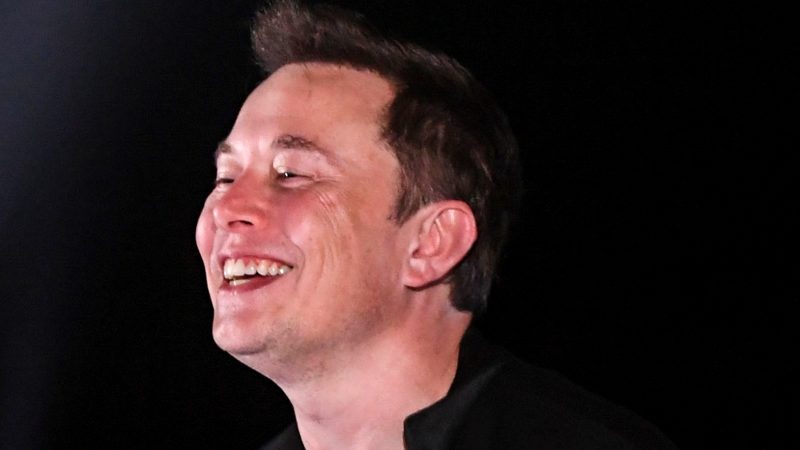It was only a year ago that Elon Musk, then simply the guy who was hoping to buy Twitter, insisted that his politics sat squarely at the center of the national spectrum. Perhaps you remember the (pilfered) meme he shared, showing the political left racing away from him while he sat there, aw-shucks-ing over how things had changed.
When combined with his stated intent to restore “free speech” to Twitter, this presentation achieved the desired effect. He wasn’t a right-winger, he just thought that people on the right who were removed from Twitter for abuse or misinformation should be allowed back on. He sold electric cars, for Pete’s sake!
Soon after he actually assumed control of Twitter, though, the idea that he was a moderate was untenable. He’d endorsed Republicans in the midterm elections, predicting a “massive red wave.” He suggested that Anthony Fauci should be prosecuted, and he elevated baseless conspiracy theories about the attack on Paul Pelosi. He engaged repeatedly with fringe-right voices on Twitter as hate-speech and misinformation thrived. All of this was before his more recent efforts to downplay white supremacism and his attacks on George Soros.
By now it seems safe to conclude that Musk’s intent in buying Twitter was not only to dismantle an institution that he perceived as a tool that empowered the media but to transform the social media platform into a heavyweight in the right-wing ecosystem. If that’s the case, he’s recently cemented two victories that bring that goal closer to reality.
On Tuesday, news broke that Florida Gov. Ron DeSantis’s (R) long-anticipated bid for the 2024 Republican presidential nomination would be announced on Twitter during a live conversation hosted by Musk himself.
Musk has long been a fan of DeSantis, stating in June that he was already leaning toward supporting the Florida governor’s likely bid. And Twitter already appears to have aided DeSantis’s campaign in at least one way.
This week, DeSantis’s Twitter handle was changed from “RonDeSantisFL” to the more nationally friendly “RonDeSantis.” The previous owner of “RonDeSantis” was Ronald Louis DeSantis, a Realtor in California who died in 2020. His account, created in 2009, is now “rondeSantis__1.” So either the Florida governor’s team reached out to his estate and managed to coordinate a swap — or Twitter facilitated the transfer. (You’ll recall Musk’s announcement this month that accounts that had been inactive for at least a month might be purged, something that he anticipated would free up old usernames.)
Regardless, that DeSantis is announcing his candidacy on Twitter is a testament to the platform’s newly achieved status on the right. DeSantis used to give favored status to Fox News, including at one point signing legislation live on the channel’s morning show. While he will still reportedly give an interview to the right-wing cable news channel after the Twitter event, the allure of the social media platform’s metrics was apparently too much to resist.
That was Musk’s other big get recently, of course: former Fox host Tucker Carlson’s announcement that he would — at some point — begin hosting a daily show on Twitter. The video Carlson published in which he revealed this plan was viewed by tens of millions of people, according to Twitter’s metrics, a level of attention that one can understand would be appealing to both Carlson and DeSantis. DeSantis’s post-Twitter interview on Fox will reportedly come during Carlson’s old time slot on Fox, a time slot that has seen tepid ratings since the former host’s ouster.
Twitter is positioned to compete against Fox News in another key way, too: Musk can provide space for fringe misinformation more easily than the cable network can. After the 2020 presidential election, Fox News found itself pulled between the massive appetite from its viewership for false claims about election fraud and its ostensible newsgathering duties. That tension led to the defamation lawsuit from Dominion Voting Systems that will cost Fox more than three-quarters of a billion dollars in a settlement. Musk’s Twitter can give that same audience an endless supply of nonsense from users that Musk can frame as his simply allowing “free speech.”
That said, it’s not clear over the long-term that the audience for that stuff will switch over from cable news. Twitter and other social media tools are much less heavily used by the older Americans who are Trump’s and Fox’s base of support. DeSantis will be speaking to lots of people on Wednesday, but how many of them are core Republican primary voters?
For the moment, Musk can bask in his successful effort to shape the political conversation. He can use the DeSantis conversation as a jumping-off point to show new or lapsed Twitter users that the platform is friendly to their politics and worldview and that — as long as they aren’t critical of foreign autocrats or China — their rhetoric is welcome.
“For Twitter to deserve public trust, it must be politically neutral,” Musk insisted soon after he made his bid to buy the company, “which effectively means upsetting the far right and the far left equally.”
So far, there’s little reason for the far right to be upset with Musk’s tenure. Quite the opposite.
